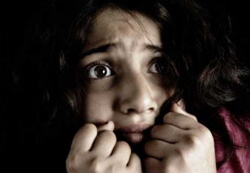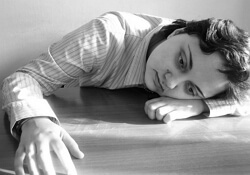Postpartum Depression
 Postpartum depression in women is a disease that occurs in the first months after childbirth and is characterized by changes in mental behavior caused by various psychotraumatic factors. Currently, this condition is a huge problem for health authorities( the indicator in the region of 15% of all women giving birth).In medical practice, the postpartum period in women is seen as the determining factor influencing infant development in the early period. As shown by the studies conducted on this issue, children, due to depressive disorders of mothers, also found neural disorders. Young mothers have unreasonable fears about courtship for their child, which violates the psychological atmosphere of communication with the child. Doctors are alarmed about the need for medical interventions in the dyad( mother-child).But how to deal with postpartum depression, if it is not being diagnosed as a long-term current in medical practice. This is due to the fact that this disorder is not officially a clinical unit and is considered together with mental abnormalities of the puerperal period and for a long time was considered postpartum depression or postnatal psychosis
Postpartum depression in women is a disease that occurs in the first months after childbirth and is characterized by changes in mental behavior caused by various psychotraumatic factors. Currently, this condition is a huge problem for health authorities( the indicator in the region of 15% of all women giving birth).In medical practice, the postpartum period in women is seen as the determining factor influencing infant development in the early period. As shown by the studies conducted on this issue, children, due to depressive disorders of mothers, also found neural disorders. Young mothers have unreasonable fears about courtship for their child, which violates the psychological atmosphere of communication with the child. Doctors are alarmed about the need for medical interventions in the dyad( mother-child).But how to deal with postpartum depression, if it is not being diagnosed as a long-term current in medical practice. This is due to the fact that this disorder is not officially a clinical unit and is considered together with mental abnormalities of the puerperal period and for a long time was considered postpartum depression or postnatal psychosis
Postpartum depression signs
How long will the postpartum depression depend on the woman, after all the main sign is reluctanceMothers seek help because of a sense of guilt that arose because of the lack of time. Feeling of anxiety and heavy weight, sluggishness and rejection of social contacts, emotional attacks with statements about abandonment of the child and the birth of the child itself is a stressful, and therefore provocative, situation for the woman. List of features continues frustration, isolation and exhausting monotonous routine, lack of pleasure, traumatic events, complications during childbirth
Postpartum depression symptoms
Symptoms presented extreme pessimism, depressed mood, feeling of loneliness, anxiety, sadness, lack of strength, insomnia, eating disorders, headachePain, ideas of self-abasement, a sense of panic, obsessive actions, rapid heartbeats, feelings of dissatisfaction, reactions of protest, Ms. Lobbies for destiny, tearfulness, sadness, the perception of a bad mother, a sense of shame, reflections on the same thing. Studies show that mothers experiencing such symptoms are prone to depressive illness in the future. The very same symptomatology of the disease is stable for a long time
Postpartum depression causes
There are two groups of mothers who develop postpartum despondency:
- young mothers who had a lack of maternal feelings and had a protracted conflict with their own mother;
- young mothers who had previously suffered depression
Women have been linked to the depressed state in the past, during pregnancy, postpartum depression, alcoholism, depression in mothers of young mothers. A high percentage of postpartum depression among mothers under 18 was found. Low socio - economic status, negative life events and the lack of financial assistance is the cause of postpartum disorders( as well as the age after 40 years), the lack of vocational training, passive wife, cessation of work before delivery, separation of mother with a baby, death or birth of a disabled child
Forms of postpartum depression
Neurotic depression, characterized by dysphobia, somatic complaints, a sense of despondency, crying, obsessive fears, fatigue, loweringSelf-esteem, a violation of sleep. As we approach the moment of birth of a child is enhanced anxiety over troubled previous birth
Major depressive disorder or clinical depression after childbirth is seen in 40% of women who were treated in a psychiatric hospital
melancholy with delusions, characterized by lethargy, ideas of self-humiliation, loss of awareness of people, Hallucinations. In most cases this is the first episode of manic-depressive psychosis
Postpartum disorder with a neurotic component due to the lack of close relatives( husband, mother)
Postpartum depression treatment
How to get rid of postpartum depression if you feel it coming? A large role is given to social, psychological, interpersonal and biological factors in treatment. Taking into account the fact that postpartum depression is not diagnosed and treated, and the contact of the giving birth to women is high with the child care specialists, this gives positive points in the treatment of this disease. Postpartum despondency itself is very similar to neurotic depression( fatigue, irritability).But to eliminate postpartum disorder, it is still important to diagnose this disease. After all, if not diagnosed, then this disease will acquire a chronic course. A woman will have a decline in self-esteem, embrace a persistent feeling of despair and helplessness. In mothers with a low economic level of income, postpartum depression turns into a chronic depression and is more common than in middle-income mothers. After giving birth, many women experience a depressive episode, but only 3% of the percent receive qualified help. At the time of delivery, a woman acquires, and then loses an imaginary baby. There comes a moment of physiology and the appearance of the baby occurs simultaneously with the intrusion into the emotional experiences of the mother, which shows the first signs of caring for the child. And at this moment the mother needs help, attention, and it is important not to miss the onset of the disease, which will come unexpectedly. All attention is focused on the imaginary child, and the mother is forgotten and does not allow the reaction of grief from the woman. And in the last trimester of pregnancy a woman acquires passivity and at the same time anxiety, heightened sensitivity. And yet how to deal with postpartum depression?
Methods of treatment: psychological counseling, cognitive-behavioral therapy( adjustment of dependent behavior and attachment to the child), psychoanalytic psychotherapy.
Of the proposed methods, women prefer cognitive therapy.
Drug therapy includes antidepressants that relieve all the symptoms of depression. But before the reception begins, consult your doctor and pediatrician. To safe antidepressants include selective and tricyclic inhibitors
Postpartum depression prevention
Support and assistance from the family can affect the prevention of postpartum disorder and the main support here is the spouse. It is recommended that you attend the courses of future parents in order to strengthen the mother-child relationship.



